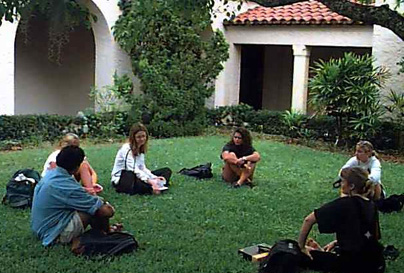How do we learn so differently from one another?
The answer depends somewhat on how you learn different subjects at varied times in your intellectual and emotional development.
Read the following case study and answer the questions about how you think you learn:
Cynthia accepted a new
position that required for her to learn a large amount of information about
computer hardware and software to be able to sell computer software programs to retail outlets in
cities she had never been to.
If you were Cynthia what would you do and how would you go about doing her job?
Would you make a list, draw a diagram, practice with the software, call people or do each of these? In what order would you do those chores? Try to list important aspects of your learning behavior and for how long would practice each new feature of your job?
Answer the above questions,
then consider how you learn new information of a technical character
with reference to the following behavioral approaches to learning new information called "acquiring new skills."
| Learning Style | Behaviors |
Symbols |
|
|
|
|
|
|
|
|
|
|
 |
|
|
|
 |
|
Look at each of the above labels and compare them to the descriptions below.
Think about how you learn new information, and how you behave when starting a new job or are asked to perform a new task.
Rank the above learning behavior when you encounter new material to learn.
| Your Ranking | Most like me | More like me | Less like me | Least like me |
| Numerical | 4 |
3 |
2 |
1 |
| Learning Styles
Or Behaviors |
||||
Quick start |
||||
Fact finder |
||||
Implementer / hands-on |
||||
Follow through |
Use a most likely to a least likely approach to this ranking. For instance put the behavior that most matches your response first and the behavior that is most often never used last! Rank the four different behavioral patterns according to the way most like you (that is the easiest for you to do and thus the most frequent approach you use to new material). The last behavioral pattern on your list should be the least like you (that is [i.e.] the most challenging aspect of a new task and thus the least frequent approach you employ when confronted with a new situation).
Do not worry about being exactly accurate . . . give your best answer by arranging the categories from most like you to least like you with respect to a recent and characteristic experience you have had and the approaches that you exercised.
Print out the above table and turn it in during class time.
Learning Styles or
QS means quick start, a quick starter is a person who learns correctly the first time.
This refers to how you learn fast or catch on to things with few mistakes in a rapid period of time.
FF means fact finder, this is a person who is really detail oriented.
This behavior is indicative of people who love to make lists of what they need to know and enjoy searching out the sources of this information because the like to check the accuracy of what they know.
I means implement, one who implements actions is a tactile or hands on learner.
This category refers to someone who enjoys being told what to do and goes ahead precisely as instructed because they like to see results and take pride in what they make, craft, or carry out.
FT means follow through, or a person who gets things done and is dependable right to the finished product.
This behavioral category is characterized by responsible actions that people perform who enjoy checking up on others or on themselves to assure that the task gets done and is done well.
Think about a challenging learning situation where you were expected to master a new set of skills, practices or a novel situation and set of instructions. What did you do to successfully accomplish the new task or assignment?
| Varieties of intelligence | Visual thinking | author index | sample annotated bibliography. |
| Go Back |
Go
on
|
![]()
Please send your questions or comments to Dr. Siry
These buttons below work as navigational aids.
This page was Last Updated on July 30, 2014; 07/30/2006 from original work done on 8/24/98.